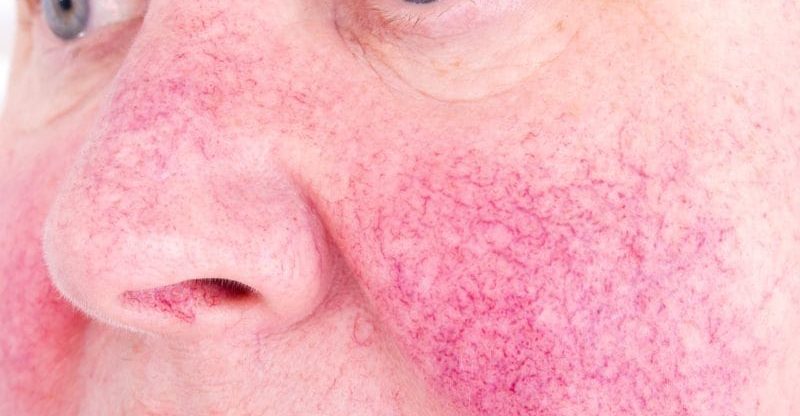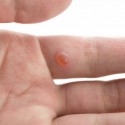Top 4 Proven Rosacea Natural Treatments
Over 15 million Americans suffer from one of the four types of rosacea.
The tell-tale rosy face rash causes embarrassment and affects self-confidence.
Learning to heal your rosacea permanently, by making changes to your lifestyle and using natural remedies, could help you find relief and a clearer complexion.
Identifying the triggers of your rosacea and reducing the dietary and lifestyle choices that raise inflammation, which is what causes rosacea, can help you reduce the frequency and severity of flare-ups.
To learn more about how to control and treat your rosacea, we will examine what causes this skin disorder, how to know which type of rosacea you have, as well as all the best natural remedies and lifestyle changes you can use to treat your complexion.
Understanding Rosacea
Most people with rosacea are not even aware of their disorder until they are diagnosed by a doctor or dermatologist.
Rosacea is often confused with other skin disorders, including acne, eczema, dermatitis, and psoriasis.
Rosacea is the result of inflammation.
It appears as a red rash on the face and chest.
What seems like pimples are actually small, pus-filled bumps that are usually red, giving you the signature rosy look of this disease.
Most people with rosacea develop it in their adult years, usually after the age of 30.
There are, however, rare instances where it develops in young adults and teens.
While rosacea is more common in women, men tend to develop more severe cases.
Over time, rosacea can cause the skin to become thicker and redder.
It can sometimes become permanent, especially when left untreated.
Rosacea Symptoms
The symptoms of this skin disorder vary greatly from person to person.
While some have just the acne-like breakouts, others can develop uneven skin texture, have scaly patches of skin, or experience itching.
Other symptoms include painful skin, darker raised patches of skin called plaques, welts, burning or stinging sensations, or redness across the cheeks, forehead, chin or nose.
Symptoms will vary, depending on the exact type of rosacea that you suffer from.
Types of Rosacea
There are four distinct varieties of rosacea.
Their common link is that they are all caused by excess inflammation in the body.
Anything that can cause dilation of the blood vessels in your face, can cause rosacea.
Understanding the type of rosacea you have, can help you to determine the most likely triggers and causes of your outbreaks.
The most common form of this skin disease is Erythematotelangiectatic rosacea.
The flushed, red face accompanied by visible blood vessels, are the most common signs of this form of the disease.
If your rash appears around your eyes, you have what is known as ocular rosacea.
This form can cause problems with your vision and lead to itchiness, redness, and sensitivity of your eyes.
If your face swells from fluid retention or if you have thickening of the skin around your nose, you have Phymatous rosacea.
Finally, if your rosacea appears as pimples, papules and other acne-like symptoms, you have papulopustular rosacea, which often appears in women in their thirties and forties.
What Causes Rosacea?
Rosacea is a skin disorder caused by inflammation.
Anything that your body finds inflammatory can lead to rosacea. This can vary widely.
Doctors have not identified an exact cause for rosacea.
However, there are some commonalities among those with the disease or risk factors that make it more likely that you will develop rosacea.
If you have abnormalities in the blood vessels in your face, you could develop rosacea.
Anything that causes inflammation in these blood vessels, could trigger an outbreak.
Those with fair skin are also much more likely to develop rosacea.
If rosacea is common in your family, it also increases your risk of developing it.
Scientists have noted that those with rosacea have much higher numbers of microscopic mites on their faces than others.
These mites are usually harmless and can be found in healthy skin.
However, those with rosacea tend to have larger populations.
It is not yet known if mites play a role in causing rosacea or if having rosacea makes your mite population expand.
Finally, new evidence suggests that the H. pylori bacteria that is found in the lining of your gut may play a role in the development of rosacea.
These bacteria produce a polypeptide that dilates blood vessels, which may contribute to rosacea outbreaks.
H. pylori also cause stomach ulcers and other gastric and immune system problems.
With this knowledge, we can identify which behaviors and lifestyle choices could be making your rosacea worse or leading to increased frequency of outbreaks.
For example, since inflammation is the body’s natural response to food allergies and sensitivities, you can work to eliminate sources of inflammation from your diet.
Improving your digestion so that you are eliminating waste regularly and digesting food fully, can also lower inflammation in your gut, that is contributing to your rosacea.
Improving the health of the microbiome of your digestive tract can ensure that your digestion and immune system are working properly and keeping inflammation low.
Hormone fluctuations can also lead to increased inflammation.
Addressing hormone issues and treating hormone deficiencies through diet, exercise, and nutritional supplements can prevent these changes and keep inflammation low.
Because the blood vessels in your face are small and close to the surface, they are susceptible to many different factors.
Changes in temperature and harsh weather conditions can trigger inflammation, as can drinking coffee or alcohol, eating fatty or spicy foods, or living with high levels of stress.
These can all trigger an inflammatory response that leads to a rosacea flare-up.
Finding and eliminating your personal triggers is important in treating your type of rosacea and reducing your symptoms.
Treating Rosacea Naturally
Knowing the causes and likely triggers of your rosacea symptoms can help you to identify the best natural solutions for lowering your symptoms.
There is no cure for this disease, but you can eliminate the sources of inflammation that are probably making your outbreaks more severe and frequent.
It may take some time and patience to identify the best treatments for your type of rosacea.
Change Your Diet
Your gut is responsible for much more than just the digestion of your food.
Taking care of this critical system can help you to not only treat your rosacea but also lower the inflammation that may be contributing to other health problems.
What you find inflammatory may be different from others.
Therefore, keeping track of your diet and symptoms may be necessary to find the right combination of foods to eliminate from your diet to achieve the best results.
Reducing inflammatory foods and drinks from your diet and replacing them with those that support gut health and microbiome diversity, can help treat your rosacea and support your immune system in other ways.
The best foods to start eliminating to see quick results include foods made with processed flour, processed sugar, dairy products, caffeine, and alcohol.
These foods contain known allergens and raise inflammation levels in a high percentage of people.
Your focus should be on filling your diet with plenty of whole fruits and vegetables, as well as other plant-based whole foods.
Seeds, nuts, and whole grains are also important.
Increasing your intake of dietary fiber is great for your gut health, as well as your overall digestion and nutrient absorption.
Eating foods that encourage the health of your gut microbiome is also essential.
Fermented and cultured foods, like sauerkraut, kombucha, kimchi, and kefir are all excellent sources of probiotics that support your gut health.
Foods high in omega-3 fatty acids are also great for reducing inflammation.
The best nutritional sources of omega-3s include cold water, oily fish like salmon, sardines, and herring, as well as chia seeds, walnuts, flaxseed, and whole eggs.
Reduce Your Stress Levels
Stress can increase your inflammatory response and cause your rosacea to become worse.
For many people, periods of high stress are a trigger for new or worsening rosacea symptoms.
Find relaxation techniques to help you decompress when under stress, and, when possible, eliminate the sources of stress in your life.
Use Natural Skin Treatments
If you have other health or skin disorders, you may want to discuss skin treatments with your dermatologist, before beginning them at home.
This is because some treatments can aggravate your symptoms or make other issues worse.
Aloe vera can be an effective topical treatment for rosacea.
The mild moisturizing compounds in the plant are excellent overall skin treatment.
Many individuals with rosacea experience clearer skin when using it.
Chamomile is known to moisturize skin as well as lower inflammation.
Chamomile essential oil is an excellent choice to apply to inflamed skin.
You can also make a compress using chamomile tea that has been brewed and then cooled.
Other essential oils that can lower skin inflammation, include helichrysum and lavender oils.
Coconut oil can also lower inflammation and moisturize your skin.
It can also be used as a carrier for the application of other essential oils.
With its natural antioxidant properties, feverfew is a favorite natural rosacea skin treatment.
Select feverfew products that are free of parthenolide, which can increase your skin’s sensitivity.
Another traditional natural rosacea skin treatment is oatmeal, which strengthens skin and reduces the loss of moisture.
Oatmeal calms itchy skin and can also reduce inflammation.
Raw Manuka honey is an excellent choice for cleansing and moisturizing skin that is affected by rosacea.
It is mild, relieves irritation and moisturizes as it cleans.
A final skin treatment for rosacea is turmeric, which is a powerful anti-inflammatory.
Turmeric works well on painful or inflamed skin.
It should be diluted with a carrier oil before it applied.
Support Your Nutritional Needs
Taking herbal supplements is another way to lower inflammation, support healthy digestion and naturally treat your rosacea symptoms.
The following herbal supplements that have been shown to be useful for people when treating rosacea.
You should always purchase supplements from reliable manufacturers, with a commitment to purity and safety.
Milk thistle is an herb that supports liver function, which can help with inflammation.
Many with rosacea see good results with this supplement.
This herb is also excellent for treating acne.
Vitamin B12 is vital for immune system response.
When your immune system is not functioning properly, inflammation is much more likely.
Gentian root stimulates bile production, which can help with digestion.
This root is bitter in taste, so be sure to dilute gentian root tincture in water, before digesting.
In addition to B12, many other B vitamins are important for your health, and those with rosacea are more likely to be deficient all or most of the B vitamins.
Taking a B-complex supplement will ensure you get everything that you need.
If you want to support your digestive process, you can take digestive enzymes, which help your system naturally break down food and promote a healthy immune system.
Conclusion
Rosacea is a skin disorder that mainly affects adults.
It is known for its rosy rash across the face and chest.
While rosacea can be confused with other disorders, it is not actually a skin disease.
It is actually an inflammatory disorder that presents with symptoms on the skin.
Treating rosacea means treating the inflammatory response that leads to the red rash common in this skin disorder.
Lowering your stress, changing your diet, using herbal treatments and treating your skin using natural products, are all ways to get rid of the pimples, bumps, and redness that are common with all four of the main types of rosacea.
Since rosacea has no cure, you must focus on eliminating triggers for your flare-ups.
It is also necessary to lower your overall inflammation levels to keep breakouts at bay.
When you start to pay attention to what causes a breakout, you can determine which of the many natural remedies and lifestyle changes known to effective for treating this skin disorder, will work best for you.
With time and patience, you can learn how to treat your rosacea naturally at home.
If your rash and symptoms do not respond to these treatments, your dermatologist can discuss other options using prescription medications or procedures.
FDA Compliance
The information on this website has not been evaluated by the Food & Drug Administration or any other medical body. We do not aim to diagnose, treat, cure or prevent any illness or disease. Information is shared for educational purposes only. You must consult your doctor before acting on any content on this website, especially if you are pregnant, nursing, taking medication, or have a medical condition.
HOW WOULD YOU RATE THIS ARTICLE?





